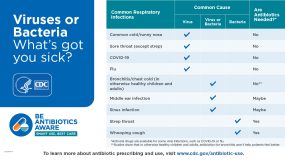Antibiotic Do’s & Don’ts
What You Can Do
Smart use of antibiotics is the best care. Here are some steps you can take to use antibiotics appropriately so you can get the best treatment when you’re sick, protect yourself from harms caused by unnecessary antibiotic use, and combat antibiotic resistance.
Take antibiotics ONLY if you need them.
Antibiotics ONLY treat certain infections caused by bacteria, such as:
- Strep throat
- Whooping cough
- Urinary tract infection (UTI)
Antibiotics DO NOT work on viruses, such as those that cause:
- Colds and runny noses, even if the mucus is thick, yellow, or green
- Most sore throats (except strep throat)
- Flu
- Most cases of chest colds (bronchitis)
Antibiotics also ARE NOT needed for some common bacterial infections, including:
- Many sinus infections
- Some ear infections
Taking antibiotics when they’re not needed won’t help you, and their side effects can still cause harm. Your doctor can decide the best treatment for you when you’re sick. Never pressure your doctor to prescribe an antibiotic.
Take antibiotics exactly as prescribed if you need them.
Dispose of Unused Medicines
See helpful tips on how to safely throw away unused medicationsexternal icon.
If your doctor decides an antibiotic is the best treatment when you’re sick:
- Take them exactly as your doctor tells you.
- Do not share your antibiotics with others.
- Do not save them for later. Talk to your pharmacist about safely discarding leftover medicines.
- Do not take antibiotics prescribed for someone else. This may delay the best treatment for you, make you even sicker, or cause side effects.
Talk with your doctor and pharmacist if you have any questions about your antibiotics.
Talk with your doctor if you develop any side effects or allergic reactions while taking an antibiotic.
In children, reactions from antibiotics are the most common cause of medication-related emergency department visits.
Common side effects range from minor to very severe health problems and can include:
- Rash
- Nausea
- Diarrhea
- Yeast infections
More about:
More serious side effects can include:
- C. diff infection, which causes diarrhea that can lead to severe colon damage and death
- Severe and life-threatening allergic reactions
- Antibiotic-resistant infections
If you need antibiotics, the benefits usually outweigh the risks of side effects and antibiotic resistance.
Ask your doctor or pharmacist about ways to feel better if an antibiotic isn’t needed.
For more information on common illnesses and how to feel better, visit Common Illnesses.
Antibiotics aren’t always the answer when you’re sick. Sometimes, the best treatment when you’re sick may be over-the-counter medication. Ask your doctor or pharmacist for tips on how to feel better while your body fights off an infection.
Do your best to stay healthy and keep others healthy.
There are steps you can take to avoid getting yourself and others sick, including:
- Clean your hands.
- Cover your mouth and nose when coughing or sneezing.
- Stay home when you’re sick.
- Avoid touching your eyes, nose, and mouth with unwashed hands.
- Avoid close contact with people who have colds or other upper respiratory infections.
- Get recommended vaccines, such as the flu vaccine.
